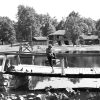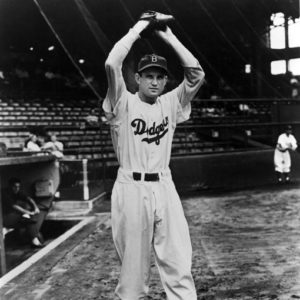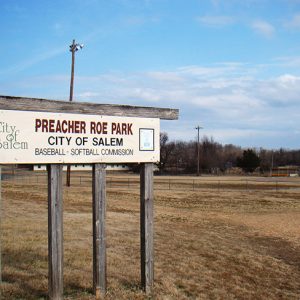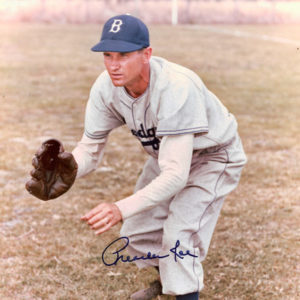calsfoundation@cals.org
"Preacher" Roe (1916–2008)
aka: Elwin Charles Roe
Elwin Charles “Preacher” Roe played professional baseball with the St. Louis Cardinals, Pittsburgh Pirates, and Brooklyn Dodgers. In the late 1940s and early 1950s, Roe was one of the top pitchers in the game.
Preacher Roe was born on February 26, 1916, to Charles Edward Roe and Elizabeth (Ducker) Roe in Ash Flat (Sharp County). The Roe family, which included six boys and one girl, moved from Wild Cherry (Fulton County), where they had moved in 1918, to Viola (Fulton County) when Roe was six. Roe’s father played for a semi-professional team in Pine Bluff (Jefferson County) but gave up baseball as a career and became a country doctor.
Roe got his nickname at about three years of age when his family lived in Wild Cherry. Although Roe has given various versions of how the nickname came about, his response in an interview in the West Plains Gazette is likely the closest to the truth: “I had an uncle that came back from the first World War who hadn’t ever seen me. He said, ‘What’s your name, young man?’ And for some reason I said, ‘Preacher.’…My mother said maybe it was because I liked the preacher we had at our church so well.”
Roe played baseball as a child, even joining a team of his brothers and other relatives to play the nine Fulton County sheriff candidates. Roe continued to play in his high school years and began pitching there before going to college.
Roe attended Harding College (now Harding University) in Searcy (White County) from 1935 to 1939 on a baseball scholarship. He pursued a degree in education and also played on the basketball team. At Harding, Roe became a sensation for the Bison baseball team at a time when, because of financial shortages, colleges in Arkansas struggled to maintain intercollegiate athletics.
Harding usually had a decent baseball team, but they were winless in 1935. Unfortunately for Roe, his teammates’ fielding was often disastrous. Even though his fielders were often unreliable, Roe was a powerhouse on the mound. Despite his lithe frame (he was 6’2″ and only 165 pounds), he could throw hard. In a thirteen-inning game in 1937, Roe gained national attention by striking out twenty-six batters. The feat attracted the attention of major league teams and their scouts, who were awed by a pitcher who could strike out an entire team nearly three times in one game. At the urging of his father, Preacher turned down offers and stayed in school for another year.
In the summer of 1938, Roe was signed by Frank Rickey, brother of Branch Rickey, then a scout and general manager for the St. Louis Cardinals. On September 8, 1938, Roe married Harding classmate and childhood sweetheart, Mozee Clay, also from Viola, and the couple had two sons, Elwin C. Jr. and Tommy.
Roe left Harding, just one semester shy of completing his degree, to play for the St. Louis Cardinals organization. Having signed late in the season, he pitched only one game for the Cardinals, and in the spring of 1939, the couple left Searcy for Rochester, New York, where Roe got his start in professional baseball with the Cardinal farm club, the Rochester Red Wings. Roe spent five years in the minor leagues with the Rochester club and in Columbus, Ohio, with the Columbus Redbirds, before getting another chance in the major leagues, this time with the Pittsburgh Pirates. He pitched the opening game for the Pirates in 1944, and even though they lost the game, he allowed only two hits. Roe had two decent seasons with Pittsburgh, going 13-11 and 14-13. In his second season with the Pirates, Roe led the National League in strikeouts.
When Roe was back home in Hardy (Sharp County) in the winter of 1945, he taught high school math and coached basketball so that he could support his family. During a basketball game, Roe got in a tussle with the referee and suffered a fractured skull.
Roe struggled during the next two seasons with Pittsburgh. He pitched only eleven games in 1946, for a 3-8 record. The following year was worse, as Roe went 4-15. Roe’s luck would change, and again it would come at the hands of Branch Rickey, who had switched clubs and became the general manager of the Brooklyn Dodgers. In a multi-player deal, Roe was traded to Brooklyn, where he became part of the legendary Boys of Summer, which included Pee Wee Reese, Jackie Robinson, Gil Hodges, and Duke Snider. In his first season with the Dodgers in 1948, Roe went 12-8.
Cardinal great Stan Musial claimed in his biography that Roe’s pitching really excelled after he left the Pirates. At Brooklyn, Roe was no longer a young kid throwing fastballs but had developed into a control pitcher and was described by baseball writer Roger Kahn as intimidating batters by making them guess at his pitches. This control led to several winning seasons with Brooklyn.
The following season, Roe went 15-6 and pitched in his first World Series. The Dodgers played the Yankees, and Roe would pitch the only victory for the Dodgers, which they won 1-0. A five-time All Star, Roe went 22-3 in 1951, which remained, as of 2004, the best single-season winning percentage for a twenty-game winner in the National League. For the 1951 season with Brooklyn, Roe was named the Sporting News Pitcher of the Year for the National League. In Roe’s career as a Dodger, he won ninety-three games and lost only thirty-seven. In 1954, Roe finished his career with a record of 127-84.
Roe retired after the 1954 season and opened a supermarket with his wife in West Plains, Missouri.
Roe was known for his philanthropy, a trend that started early in his career. After signing with the Cardinals, and while still attending Harding College in 1938, he donated twelve new uniforms to the college basketball team. Roe remained active in the communities of southern Missouri and northern Arkansas, raising money to complete baseball fields and pitching in benefit games.
He was inducted into the Arkansas Sports Hall of Fame in 1967, the National Association of Intercollegiate Athletics Hall of Fame in 1976, and the Missouri Sports Hall of Fame in 1998. Roe died on November 9, 2008.
For additional information:
Epstein, Ben. “Arkansas’s Newest Pitching Sensation Taught By His Dad.” Arkansas Gazette, May 2, 1937, p. 12.
Erskine, Carl. Tales from the Dodger Dugout. Champaign, IL: Sports Publishing, 2000.
Garner, Linn. “A Study of the Life of Elwin ‘Preacher’ Roe.” MA thesis, Arkansas State College, 1959.
Hampton, Terry. “Preacher Roe: Our Own Boy of Summer.” West Plains Gazette 26, no. 2 (1984): 6–16, 66–69.
Kahn, Roger. The Head Game: Baseball Seen from the Pitcher’s Mound. New York: Harcourt, 2000.
Rosenthal, Harold. “The Dodgers’ Oddest Star.” Saturday Evening Post 3 (February 1951): 30, 64–67.
Dave Malone
Kansas City, Missouri
 Early Twentieth Century, 1901 through 1940
Early Twentieth Century, 1901 through 1940 Recreation and Sports
Recreation and Sports "Preacher" Roe
"Preacher" Roe  Preacher Roe Park
Preacher Roe Park  "Preacher" Roe
"Preacher" Roe 




Comments
No comments on this entry yet.